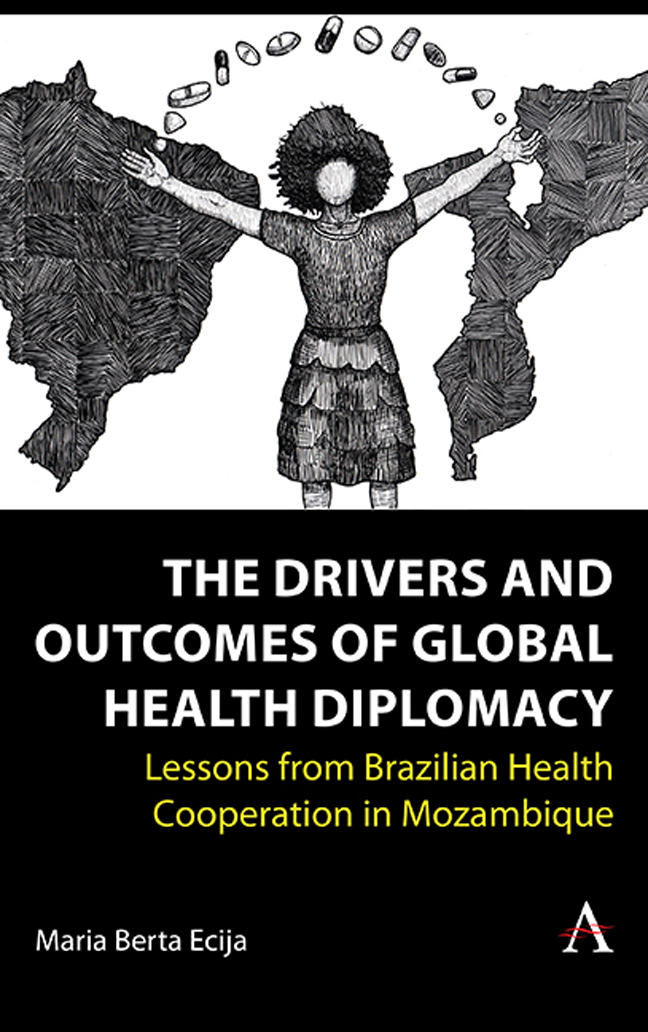 The Drivers and Outcomes of Global Health Diplomacy
The Drivers and Outcomes of Global Health Diplomacy Book contents
- Frontmatter
- Contents
- List of Abbreviations
- 1 Introduction and Methodology
- 2 Literature Review on Global Health Diplomacy – Brazil and Mozambique
- 3 Brazil and Global Health Diplomacy
- 4 Mozambique’s Foreign and Health Policy
- 5 Case Study of Sociedade Moçambicana de Medicamentos
- 6 Analysis and Outcomes
- 7 Conclusion
- Post-script: COVID-19 Disclaimer
- Bibliography
- Index
6 - Analysis and Outcomes
Published online by Cambridge University Press: 29 February 2024
- Frontmatter
- Contents
- List of Abbreviations
- 1 Introduction and Methodology
- 2 Literature Review on Global Health Diplomacy – Brazil and Mozambique
- 3 Brazil and Global Health Diplomacy
- 4 Mozambique’s Foreign and Health Policy
- 5 Case Study of Sociedade Moçambicana de Medicamentos
- 6 Analysis and Outcomes
- 7 Conclusion
- Post-script: COVID-19 Disclaimer
- Bibliography
- Index
Summary
Global Health Diplomacy and the Nexus of Power
Health and diplomacy are both in a process of transformation
Kickbusch, 2011, p. 1Global health diplomacy offered its most significant contributions as a discipline in the early 2000s, as discussed in Chapter 2, with the consolidation of a new global order, as a result of the end of the Cold War. The world became multipolar; consequently, emerging countries such as India, China and Brazil saw the opportunity to become influential participants in the international system. Institutions played a significant role in mediating and combining different interests and policymaking objectives among these new relevant actors. Globalisation was the main modus of international politics, which offered significant changes to decision-making strategies and processes. As a result of attempts to deal with the consequences of a globalised world order, diplomacy also changed. As rightfully pointed out by Bourne (2008, p. 153), it became a 24-hour business, and policymakers, as well as political leaders, needed to adapt to this fast-paced mode of international policymaking.
Davies et al. (2014, p. 825) claim that the emergence of global health and its integration into the international relations field has contributed to new debates and assumptions within the discipline. According to them, over the past 10 years, we have been witnessing more publications and debates in the fields of security and health, global governance, international organisational strategies and political economy and health. There have also been more global health activities to raise awareness of pressing global health challenges of a transnational nature. The combination of these factors has led to the understanding that health, as a matter of international relations, is very close to human and social security, raising more demands for concerted international responses to threats.
The genesis of health diplomacy relied on changes in the international system at the beginning of the twenty-first century. However, it is essential to follow this lead and see the consequences of these changes. According to Kickbusch (2011, p. 2), these new scenarios enabled the emergence of new actors in an exciting multi-actor environment. Over the past number of decades, we have witnessed an increase in diplomatic arrangements across multilateral institutions, such as the UNSC, UNGA, World Bank, G8 and WHO, which have sought to address many more health issues.
- Type
- Chapter
- Information
- The Drivers and Outcomes of Global Health DiplomacyLessons from Brazilian Health Cooperation in Mozambique, pp. 163 - 210Publisher: Anthem PressPrint publication year: 2023


